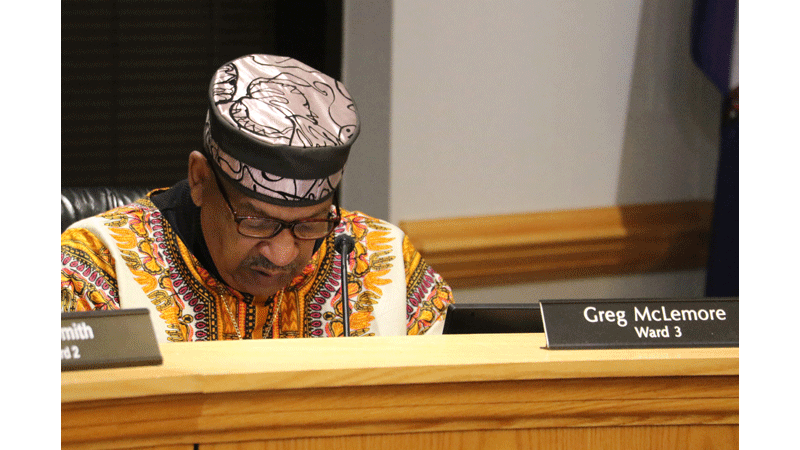Black History Month resolution adopted
Published 11:46 am Wednesday, February 28, 2024

- Franklin Ward 3 Councilman Gregory McLemore reads a resolution celebrating Black History Month during the Franklin City Council’s meeting on Monday, Feb. 12. (Photo by Titus Mohler)
|
Getting your Trinity Audio player ready...
|
The Franklin City Council voted unanimously Monday, Feb. 12, to adopt a resolution celebrating Black History Month.
As a prelude to the reading of the resolution by Ward 3 Councilman Gregory McLemore, Franklin City Manager Amanda C. Jarratt said, “We just take pride in adopting the Black History Month resolution each year and look forward to the adoption this evening.”
The resolution reads as follows:
“Whereas, Black History Month in the United States is a historic tradition beginning in 1926 when historian Carter G. Woodson and the Association of Negro Life and History dedicated the second week in February as ‘Negro History Week’; and
“Whereas, in 1976, as part of the nation’s bicentennial, Black History Week was expanded and became established as Black History Month and is now celebrated all over North America; and
“Whereas, the rich inventions, courage, resolve and cultural influences delivered to the nation by African Americans have been traditionally recognized regionally by the state of Virginia; and
“Whereas, Virginia is home to the longest continuous experience of Black life and culture in the United States spanning more than four centuries, beginning before the first English settlement at Jamestown and through the Revolutionary War, Civil War, Emancipation and the Civil Rights eras; and
“Whereas, Nat Turner being an enslaved preacher who led a two-day rebellion, known as the Nat Turner Rebellion, of both enslaved and free people in Southampton County, Virginia, the rebellion being suppressed at Belmont Plantation on Aug. 23, 1831, and resulted in state legislatures passing new laws prohibiting education of slaves and free African Americans, restricting right of assembly and other civil liberties for free African Americans;
“Whereas, Dred Scott, known for Dred Scott v. Sanford, was born into slavery around 1799 in Southampton County, Virginia, in January 1850 won his freedom, the case being reversed in 1852, making Dred Scott enslaved again, after several appeals, taking the case to the United States Supreme Court, giving Dred Scott and his family freedom on May 26, 1857;
“Now, therefore, be it resolved, the city of Franklin celebrates February 2024 as Black History Month and that it calls upon all the city of Franklin’s citizens to observe this month with programs, celebrations, ceremonies and activities recognizing the amazing and everlasting efforts and accomplishments of African Americans.”
McLemore had an item added to the agenda that followed his reading of the resolution.
“In recognition of Black History Month, I would like to share a Black history fact,” he said. “Feel free to check with your phones to Google this information. In 1903, Wilbur and Orville Wright were credited with inventing the airplane. The name you would want to Google is Charles Page.”
In an article by Melinda Martinez for an Alexandria, Louisiana-based publication called The Town Talk, local historian Mike Wynne offered insights on Page, a man of Pineville, Louisiana.
“Charles Page is an absolutely fascinating African American,” Wynne was quoted as saying in the article. “He was actually born a slave in 1864, we believe. Yet, in 1898 he decided to create an airplane.”
Wynne stated that Page’s grandson, Joseph P. Page, was told that his grandfather would watch bugs fly and say, “I could do that.”
Martinez wrote that according to Wynne, after five years of work, Page created a working airplane.
“In 1904, he decided to use his life savings to build a full-scale model of the airplane and ship it to the Louisiana Purchase Exposition in St. Louis, Missouri,” Wynne said.
Martinez noted that the Exposition was also known as the St. Louis World’s Fair.
Unfortunately, something went wrong, Martinez wrote, and Page’s plane never made it to the big event.
She quoted Page’s grandson, who said, “I don’t know whether it got lost or somebody stole it or whatever,” and she noted that Wynne said, “His model was stolen or destroyed — maybe possibly due to the fact that he was an African-American — we’ll never know. This devastated him and bankrupted Mr. Page, and he basically gave up on his idea.”
Martinez noted that despite the devastating loss of the airship, Page received his patent for it in April 1906.
“He received his patent before the Wright brothers received their patent for the airship,” Wynne said. “But he let it expire. And he became forgotten about.”
But Page did many other things during his lifetime, Martinez wrote.
“He was a leading citizen and just an incredible man,” Wynne said, adding that Page was the first man — definitely the first African-American — to ever receive a patent for an airplane.
Martinez’s article can be found at www.TheTownTalk.com and is titled “Aviation history: Did you know 2 Louisiana men built first airship, working helicopter?”





